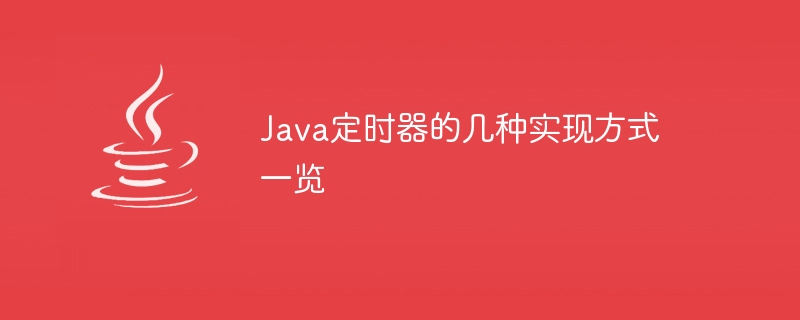Home >Java >javaTutorial >Overview of various implementations of Java timers

Overview of several implementation methods of Java timer, specific code examples are required
With the continuous development of computer technology, programmers often encounter problems when developing applications. To the need to perform certain tasks at certain intervals or at specified points in time. As a widely used programming language, Java provides a variety of timer implementations to meet such needs. This article will introduce several common timer implementation methods in Java and provide specific code examples.
The following is a sample code that uses the Timer class to implement scheduled tasks:
import java.util.Timer;
import java.util.TimerTask;
public class TimerExample {
public static void main(String[] args) {
Timer timer = new Timer();
TimerTask task = new TimerTask() {
@Override
public void run() {
System.out.println("定时任务执行了!");
}
};
// 1秒后执行任务,之后每隔3秒执行一次
timer.schedule(task, 1000, 3000);
}
}The following is a sample code that uses the ScheduledExecutorService interface to implement scheduled tasks:
import java.util.concurrent.Executors;
import java.util.concurrent.ScheduledExecutorService;
import java.util.concurrent.TimeUnit;
public class ScheduledExecutorServiceExample {
public static void main(String[] args) {
ScheduledExecutorService executor = Executors.newScheduledThreadPool(1);
Runnable task = new Runnable() {
@Override
public void run() {
System.out.println("定时任务执行了!");
}
};
// 1秒后执行任务,之后每隔3秒执行一次
executor.scheduleAtFixedRate(task, 1, 3, TimeUnit.SECONDS);
}
}The following is a sample code that uses the Quartz framework to implement scheduled tasks:
import org.quartz.*;
import org.quartz.impl.StdSchedulerFactory;
public class QuartzExample {
public static void main(String[] args) throws SchedulerException {
Scheduler scheduler = StdSchedulerFactory.getDefaultScheduler();
JobDetail jobDetail = JobBuilder.newJob(MyJob.class)
.withIdentity("myJob", "group1")
.build();
Trigger trigger = TriggerBuilder.newTrigger()
.withIdentity("myTrigger", "group1")
.startNow()
.withSchedule(SimpleScheduleBuilder.simpleSchedule()
.withIntervalInSeconds(3)
.repeatForever())
.build();
scheduler.scheduleJob(jobDetail, trigger);
scheduler.start();
}
public static class MyJob implements Job {
@Override
public void execute(JobExecutionContext jobExecutionContext) throws JobExecutionException {
System.out.println("定时任务执行了!");
}
}
}The above is an introduction and code examples of several common Java timer implementation methods. Depending on the actual needs and project scale, choosing an appropriate timer implementation is very important to ensure the timely and accurate execution of tasks. Developers can flexibly choose to use the Timer class, ScheduledExecutorService interface or Quartz framework to implement scheduling and execution of scheduled tasks according to their own needs.
The above is the detailed content of Overview of various implementations of Java timers. For more information, please follow other related articles on the PHP Chinese website!